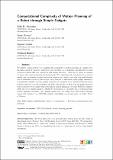Computational complexity of motion planning of a robot through simple gadgets
Author(s)
Demaine, Erik
DownloadPublished version (559.3Kb)
Publisher with Creative Commons License
Publisher with Creative Commons License
Creative Commons Attribution
Terms of use
Metadata
Show full item recordAbstract
© Erik D. Demaine, Isaac Grosof, Jayson Lynch, and Mikhail Rudoy; licensed under Creative Commons License CC-BY 9th International Conference on Fun with Algorithms (FUN 2018). We initiate a general theory for analyzing the complexity of motion planning of a single robot through a graph of "gadgets", each with their own state, set of locations, and allowed traversals between locations that can depend on and change the state. This type of setup is common to many robot motion planning hardness proofs. We characterize the complexity for a natural simple case: each gadget connects up to four locations in a perfect matching (but each direction can be traversable or not in the current state), has one or two states, every gadget traversal is immediately undoable, and that gadget locations are connected by an always-traversable forest, possibly restricted to avoid crossings in the plane. Specifically, we show that any single nontrivial four-location two-state gadget type is enough for motion planning to become PSPACE-complete, while any set of simpler gadgets (effectively two-location or one-state) has a polynomial-time motion planning algorithm. As a sample application, our results show that motion planning games with "spinners" are PSPACE-complete, establishing a new hard aspect of Zelda: Oracle of Seasons.
Date issued
2018Department
Massachusetts Institute of Technology. Computer Science and Artificial Intelligence LaboratoryCitation
Demaine, Erik. 2018. "Computational complexity of motion planning of a robot through simple gadgets."
Version: Final published version